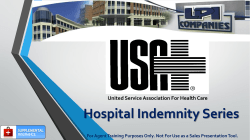
EAST AYRSHIRE INTEGRATION JOINT BOARD 2 APRIL 2015
EAST AYRSHIRE INTEGRATION JOINT BOARD 2 APRIL 2015 CLINICAL NEGLIGENCE AND OTHER RISKS INDEMNITY SCHEME (CNORIS) Report By: Board Chief Financial Officer (Designate) PURPOSE OF REPORT 1. To seek approval from the Board to submit an application to become a member of the Clinical Negligence and Other Risks Scheme (CNORIS), “The Scheme”. BACKGROUND 2. CNORIS is a risk transfer and financing scheme which was established in 1999 for NHS organisations in Scotland. the primary objective of which is to provide a cost effective risk pooling and claims management arrangement for those organisations which it covers. 3. The scheme’s basic objectives are: To provide advice on clinical and non-clinical scheme coverage to all parts of the NHS in Scotland. To support scheme Members in an advisory capacity in order to reduce their risks. To indemnify our Members against losses which qualify for scheme cover. To allocate equitable contributions amongst our Members to fund their qualifying losses. To provide Members with scheme financial updates throughout the year to help with financial management and planning. To help manage risk by providing Members with clinical and non-clinical loss analysis throughout the year. 4. The Scottish Government Health and Social Care Directorate (SGHSCD) fund all large losses (those above the current scheme excess of £25,000) during each financial year. At the end of the financial year SGHSCD collect funds from Members to pay back the deficit accrued in-year. 5. In order to share the cost fairly between Members, clinical and non-clinical risk profiles are created which determine relative risks for each organisation. The total annual deficit is then shared between Members according to their proportion of the overall risk. 6. In eliminating the need to forecast losses, or to reserve funds within the scheme, Members contribute to losses only during the period in which they have settled, enabling Members to retain funds for investment in frontline services for the longest possible period. 7. CNORIS membership and associated cover is in place for NHS Ayrshire and Arran, with East Ayrshire Council having appropriate insurance covers in place. These existing arrangements will remain in place and will continue to provide the relevant cover for the services delivered by the Council and NHS Board. The IJB CNORIS application would specifically cover the risks associated with the IJB decision making processes. COVER PROVIDED 8. In summary CNORIS provides indemnity to Member organisations in relation to Employer’s Liability, Public / Product Liability and Professional Indemnity type risks (inter alia) no less wider than that generally available within the commercial insurance market. The Scheme will provide “Indemnity to Principle” where required. CNORIS also provides cover in relation to Clinical Negligence. 9. The Scheme provides indemnity to Member organisations in relation to their legal liability associated with work experience recruits of whatever age acting on behalf of the Member organisations. CNORIS will similarly provide indemnity to member organisations in relation to their legal liability associated with students working with the Member organisation on placement from an educational establishment. 10. CNORIS provides indemnity in relation to legal liability of Member organisations associated with volunteers of whatever age acting directly on behalf of the Member organisation. For the avoidance of doubt, no cover is provided in relation to voluntary organisations. LEGISLATIVE CHANGES 11. The National Health Service (Clinical Negligence and Other Risks Indemnity Scheme) (Scotland) Amendment Regulations 2015 amend the National Health Service (Clinical Negligence and Other Risks Indemnity Scheme) (Scotland) Regulations 2000 (“the principal Regulations”). 12. The principal Regulations establish the Clinical Negligence and Other Risks Indemnity Scheme (“the Scheme”) which makes provision for meeting liabilities and indemnity in respect of other financial loss by scheme members. By virtue of the principal Regulations, all Health Boards, other statutory health bodies and the Mental Welfare Commission must be members of the scheme. 13. These Regulations amend the provisions of the principal Regulations so that integration joint boards and local authorities may become members of the Scheme. FINANCIAL IMPLICATIONS 14. In calculating the contribution that the Integration Joint Board will require to make to the scheme Scottish Ministers will take into account: their estimate of the total amount which will, by virtue of regulation 9 (payments under the Scheme), fall to be paid during that membership year in respect of all qualifying liabilities and financial losses under the Scheme; the nature of the member’s relevant functions; the number of employees of the member who are engaged in its performance of a relevant function, or any part of such a function, and the qualifications and experience of those employees; and their assessment of– (i) the effectiveness of any steps being taken, or to be taken, by the member, with a view to reducing the incidence of qualifying liabilities and financial losses in connection with any relevant function; and (ii) the effectiveness of any such steps which may previously have been taken; and may have regard to any other factor concerning that or any other member or the Scheme which they consider to be material to their determination. 15. Indicative costs are expected to be less than £0.005m per annum given that there are no previous claims, and that all employees continue to be employed by either the Health Board or the Council. This should therefore be reflected in the risk profile of the IJB. 16. It should be noted that there is an excess of £25,000 per claim that will require to be funded by the IJB. LEGAL AND POLICY IMPLICATIONS 17. The National Health Service (Clinical Negligence and Other Risks Indemnity Scheme) (Scotland) Amendment Regulations 2015 amend the National Health Service (Clinical Negligence and Other Risks Indemnity Scheme) (Scotland) Regulations 2000 (“the principal Regulations”), and allows the Integration Joint Board to apply to the Scottish Ministers for membership of the scheme. RISK IMPLICATIONS 18. Membership of CNORIS would provide cover in respect of any claim made against the IJB itself in terms of Officers / Officials Indemnity, albeit the possibility of a claim is considered low given that operational service delivery remains with the Health Board and the Council following delegation. 19. Acceptance of the IJB to membership of CNORIS will require to be determined by the Scottish Government. While they have committed to turning around the application as quickly as possible, there will be a short period where no cover is in place. The regulations do not provide for retrospective cover and there is therefore a risk that in the intervening period, should a decision made by the IJB subsequently lead to a loss to a third party for which the IJB is found to be negligent, then this loss would not be covered by CNORIS and would require to be self financed. 20. It is therefore important that an application be made to join CNORIS without delay, noting that an application cannot made until the Board is formally constituted, and the earliest possible joining date per the legislation is 3 April 2015. An application has been completed and will be submitted to the Scottish Government immediately following this meeting, should the IJB agree to seek membership of the CNORIS scheme. RECOMMENDATIONS 21. It is recommended that: (i) The Board agrees to seek membership of the CNORIS Scheme through application to the Scottish Ministers; (ii) Otherwise notes the content of the report Craig McArthur Board Chief Financial Officer (Designate) 23 March 2015
© Copyright 2025












